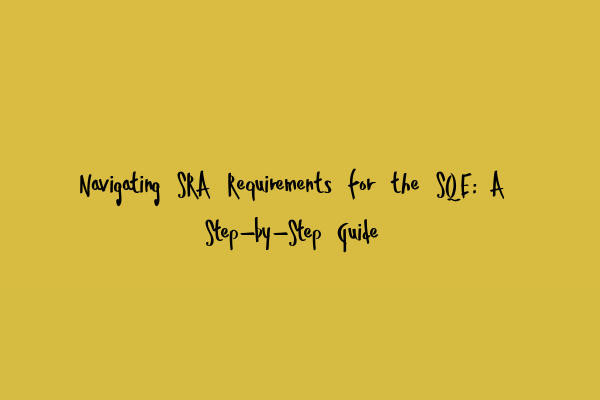Navigating SRA Requirements for the SQE: A Step-by-Step Guide
Are you aspiring to become a qualified solicitor in England and Wales? The Solicitors Regulation Authority (SRA) recently introduced the Solicitors Qualifying Examination (SQE), a new assessment framework that replaces the traditional Qualifying Law Degrees (QLD) and Legal Practice Course (LPC). As an aspiring solicitor, it’s essential to understand the requirements laid out by the SRA and how to navigate them effectively. In this step-by-step guide, we will help you understand the key elements of the SRA requirements and provide guidance on successfully tackling them.
1. Education and Work Experience
To qualify as a solicitor, you must possess a degree or equivalent qualification. Under the SQE, there are no specific educational requirements, but a degree in any subject is highly recommended. Alongside your education, you need to complete a two-years’ work experience, either as a law graduate or through the SRA’s Equivalent Means route. It’s crucial to maintain a comprehensive record of your work experience, including details of the tasks performed and the skills acquired.
2. SQE: Advantages and Structure
The SQE consists of two stages: SQE1 and SQE2. The former assesses functioning legal knowledge through multiple-choice questions, while the latter focuses on practical legal skills through written and oral assessments. The advantages of the SQE lie in its flexibility, accessibility, and cost-effectiveness. With the modular nature of the examination, candidates have the liberty to address specific aspects of the law at their own pace.
3. SQE Preparation: Self-study or External Training?
Preparing for the SQE can be a daunting task, and it’s crucial to adopt an effective study strategy. Some candidates prefer self-study, relying on resources such as textbooks, online forums, and practice papers. Others opt for external training providers that offer comprehensive SQE-specific courses. Both approaches have their merits, but it’s essential to choose the path that best suits your learning style and needs.
4. SRA Character and Suitability Requirements
In addition to the examination, the SRA evaluates candidates’ character and suitability to practice law. This assessment aims to ensure that individuals entering the profession uphold high ethical standards and possess the necessary personal qualities. Factors such as criminal records, financial standing, and disciplinary matters are taken into account. It’s crucial to maintain a clean record and be prepared to provide any necessary information to satisfy the SRA’s requirements.
5. Enhanced Occupational Competence
To complement the knowledge and skills gained through the SQE, the SRA also emphasizes the importance of ongoing learning and development. As a solicitor, maintaining a high level of competence is essential to provide quality legal services. The SRA’s Continuing Professional Development (CPD) requirements help solicitors stay up-to-date with legal developments and ensure their skills are continually honed.
6. Assessment and Examination Techniques
To succeed in the SQE, it’s important to familiarize yourself with effective examination techniques. Time management, comprehensive revision, and practicing under exam conditions are key elements in achieving success. Additionally, understanding the assessment criteria and how to effectively structure written answers or present arguments in oral assessments is vital. Regular practice, seeking feedback, and adapting your approach accordingly are all integral to earning high scores.
In conclusion, navigating the SRA requirements for the SQE is a complex yet achievable task. By understanding the key elements and following these step-by-step guidelines, you will be better equipped to succeed in your journey toward becoming a qualified solicitor. Remember, thorough preparation, ongoing development, and maintaining a high level of professionalism are essential to thriving in the legal profession. Good luck on your SQE journey!
For more information on the Solicitors Qualifying Examination and the SRA requirements, please visit [Your Law Firm’s Website], where we provide detailed guidance and support for aspiring solicitors.

Leave a Reply